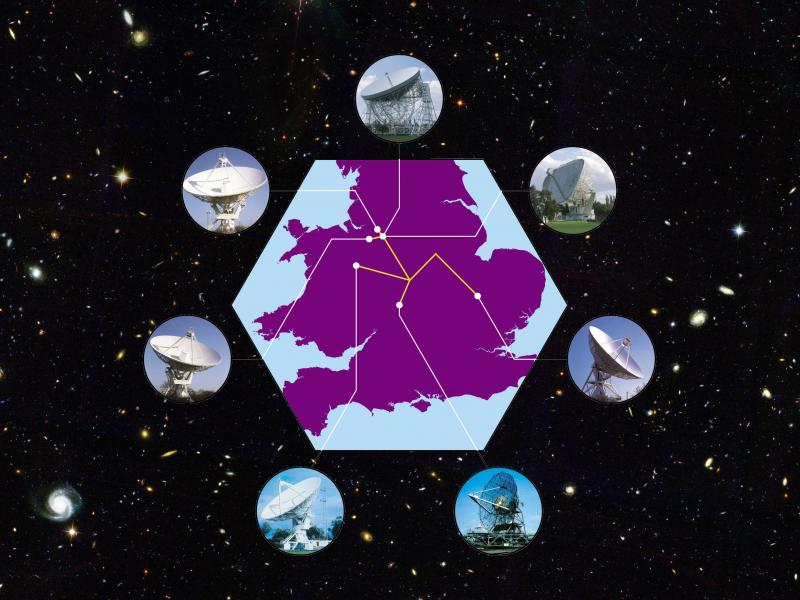
e-MERLIN is a unique astronomical facility, which provides radio imaging, spectroscopy and polarimetry with 10-150 milliarcsecond resolution and microJansky sensitivity at centimetre wavelengths. It supplies the short-baseline high-sensitivity complement to the European VLBI Network and provides a natural matched-resolution centimetre-wave complement to ALMA at millimetre wavelengths.
e-MERLIN is recognized by the SKA project as one of the pathfinders to SKA: scientifically, it provides a stepping stone towards the characterization of the sub-microJansky source population with high angular resolution and it involves important technological developments relevant to SKA, in particular high-bandwidth long-distance data transport (210 Gb/s total, with a maximum link of over 400km) and synchronization at the picosecond level over optical fibre links. e-MERLIN together with the other ‘new-generation’ instruments, such as e-VLBI and LOFAR, will attract, develop and equip a new generation of astronomers with the background and specialized skills to use the SKA.
STFC and the University of Manchester now operate e-MERLIN under a contractual framework, which runs until at least April 2014. It is hoped that this arrangement will continue in some form beyond that date, and at least until the SKA is operational in 2020.
The e-MERLIN upgrade includes new receivers (with improved sensitivity, wide frequency coverage, and greater flexibility) and a 210 Gb/s optical fibre network has been installed to connect each telescope to a powerful new correlator at Jodrell Bank Observatory. ‘First fringes’ with e-MERLIN were obtained in 2009 and the system is now in the final stages of commissioning: the first images with the full network were made in September 2010.
e-MERLIN will have a maximum instantaneous bandwidth of 4 GHz, giving a sensitivity of a few micro Jy/beam at its prime frequencies of 1,5 & 6 GHz. Together with the high resolution provided by the long baselines and the wide-field, spectroscopic and polarisation capabilities enabled by the new correlator, this will enable a wide range of new science programmes to be undertaken.
The key scientific topics for e-MERLIN cover a broad range from studies of pebble-sized grains in the process of aggregation into planets in disks around nearby stars to the growth and evolution of distant galaxies. Some of these key topics will be investigated through the e-MERLIN Legacy Programme which comprises 5,000hrs of allocated time during the first 2,5 years of operations of the telescope. The proposals received requested a total of over 10,000 hours and involved 325 astronomers from over 100 institutes in more than 20 countries. This gives an indication of the demand for e-MERLIN and the size and spread of the user-community.
The majority of the remaining observing time, about 50% of the total, is available to the entire astronomical community through the normal peer-reviewed proposal process. It is primarily this time, which forms the basis of this Transnational Access Programme.
The expected science highlights of the legacy and open-time projects may include:
- the first detections of pebble-sized building blocks of planets orbiting nearby young stars,
- tests of how outflows of material determine the formation of young stars
- an examination of where and how stars are born in nearby galaxies, including effects on the IMF
- the physics of radio jets from super-massive black holes and their influence on their host galaxies
- surveys of distant galaxies to measure the history of star-formation and the role of black holes in galaxy
evolution
- precise measurements of gravitationally lensed objects to determine the mass profiles of the centres of
galaxies and investigate their dark matter haloes
View e-MERLIN in a larger map |
Contact:
Dr. S. Garrington
e-mail: simon [dot] garrington [at] manchester [dot] ac [dot] uk
University of Manchester
Jodrell Bank Observatory
Macclesfield
Cheshire SK11 9DL
United Kingdom
website
|


